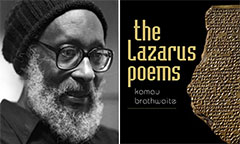The Lazarus Poems, by renowned Barbadian poet Kamau Brathwaite, is characteristically sui generis, vatic, and strange. The book is a mystical masterwork that exhibits a well-earned ornery bravura. Tonally and typographically frenetic in the “sycorax video style” he’s been employing for decades, the work examines a major theme appropriate to a great poet in the late stages of his career: the afterlife. Brathwaite achieves a kind of spiritual/aesthetic GPS in a series of poems outlining experiences of “Cultural Lynching.” These poems speak of appropriation, theft, isolation, and exploitation, all within a context of an American hegemony that intensifies racial politics and agism. Brathwaite’s expression of pain and outrage are almost overwhelming. Filled with longing, rage, nostalgia, impotence, wisdom, and love, this book is moving in every sense of the word.
KAMAU BRATHWAITE is an internationally celebrated poet, performer, and cultural theorist. He has won numerous awards, including the Neustadt International Prize for Literature and the Griffin Poetry Prize, for Born to Slow Horses. A retired professor of comparative literature at New York University, Brathwaite now lives in CowPastor, Barbados.
“No one writes like Kamau Brathwaite. He is a poet of global importance. The book is an intimate, mystical lens to gaze across time periods and literary modes and frames. The overall effect is mesmerizing, even transcendent, from his lush, mystical descriptions of island nature to his totally unexpected arresting invitation to a beheading. This is a liberatory, heartbreaking book.”
—Joyelle McSweeney, author of Dead Youth, or, The Leaks
“This book is Kamau Brathwaite’s grand, retrospective understanding of his entire poetics—which has extended and developed and ramified across well over half a century of enormous human change. It is also a culmination of his insistent, original vision. Lazarus, recalled from the dead, is reprised in the history of the collective mind of a once enslaved and now resurrected people—a mind embodied in the individual mind of this magnificent poet and called back to life by his absolute freedom to speak.”
—Vijay Seshadri, Pulitzer Prize–winning poet







